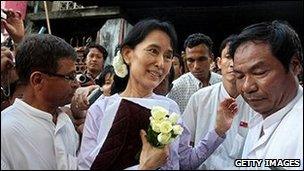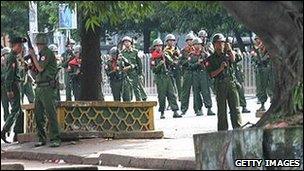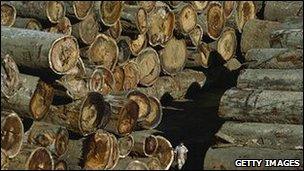Burma sanctions may be nearing end
- Published

Sanctions may be lifted after the release of Aung San Suu Kyi
The release of the pro-democracy leader Aung San Suu Kyi has led to speculation that sanctions against Burma and its military rulers could soon be dropped.
"If the people really want sanctions to be lifted, I will consider it," Miss Suu Kyi told reporters in her first news conference after her release.
Sanctions ranging from embargoes on arms sales to visa bans have been in place for more than 20 years in Burma, in an attempt by Western governments to prompt the military leaders to engage in political reform.
But the imposition of sanctions has not been uniform and, many argue, has not had the desired impact.
Most sanctions have been placed by Western governments, which traditionally were strong trading partners and investors in Burma.
The first measures were taken against Burma by the EU and the US following the crushing of the democracy uprising in 1988.
These included an end to development assistance and an arms embargo.

Tougher sanctions were introduced after clashes between the military and monks in 2007
A significant racheting-up of sanctions came in 1996, when the EU adopted a Common Position on Burma, including a ban on arms or weapons or any equipment that could be used for repression.
The following year, a ban on new investment in Burma by US persons and organisations was announced by US authorities.
Limited impact
But the sanctions never worked in the ways that supporters of Aung San Suu Kyi might have hoped.
In the first instance, they were patchy, either in the way they were enforced or in the products and services that were targeted. And in the second, they were not retrospective.
"Divisions within the EU have weakened the EU's influence with sanctions," says Burma Campaign UK director Mark Farmaner.
Some countries - notably the UK, Czech Republic, Netherlands, Ireland and Denmark - have consistently called for increasing pressure, while the likes of France and Germany have been opposed to any such action.
"France's opposition to stronger EU sanctions is attributed to the fact that Total Oil, France's largest company, is a big investor in Burma," says Mr Farmaner.
The US ban on investment lacked teeth, because most major investment had already taken place. Links that had been established before 1997 could continue to be nourished, reaping returns for American investors.
So despite what look like tough economic sanctions, a US company, Unocal (now Chevron), in a joint venture with France's Total, was able to carry on developing the Yadana gas project, one of the biggest sources of foreign currency for the Burmese military junta.
And as Mr Farmaner points out, many of Burma's key exports were not initially included in any list of sanctions.
"Until 2008, three of the top exports earning revenue for the dictatorship, gas, timber and gems, had not been significantly touched by any sanctions. This changed after the crushing of the monk-led uprising in 2007," says Mr Farmaner.
Asian influence
While pro-democracy groups in the West have criticised their governments for the way sanctions have been placed and their lack of support, neighbouring countries in Asia have taken a different approach to Burma.
Most of Burma's Asian neighbours, such as Thailand, India and China, have continued trading with the country and remained silent about the detention of Miss Suu Kyi.
Investment by these countries in Burma has actually increased during the period that sanctions have been in place.

Teak is one of Burma's valuable exports
China has poured billions of dollars into Burma and now accounts for two-thirds of its total investment over the past 20 years, according to Burmese state media.
"China is certainly still the 'bagman' for Burma, and will be by far Burma's most important economic partner," says Sean Turnell, economics professor and Burma expert at Macquarie University in Australia.
"Currently it is Chinese banks that have taken the role of providing the safe haven for the regime and the funds they secrete offshore deriving from the gas exports," Prof Turnell told the BBC.
Energy source
One of the principal reasons for interest in the area is because of its natural resources.
Burma is the world's 10th biggest and Asia's top exporter of natural gas.
According to the Foreign Office, natural gas exports are now Burma's main source of foreign exchange income, its sales making up 12.5% of Burma's GDP.
The world is hungry for energy and Burma will soon be in a position to start transforming itself from one of the world's poorest economies.
So do the sanctions by Western democracies have any impact on Burma and its military leaders? Yes, according to Prof Turnell.
"The US and Europe remain very influential," he says, "especially amongst that crucial 'connected' business elite. They crave to send their kids to Western universities, they want to travel, they want legitimacy, and they do not really trust Chinese financial institutions. "
Suu Kyi's influence
Experts say that the military generals are keen to promote economic growth and Miss Suu Kyi holds sway over international opinion and sanctions policy.
She says she will listen to the people when it comes to lifting sanctions. But she, as well as the wider world, will be keenly aware of the more than 2,000 political prisoners still being held in Burmese prisons.
And for all the jubilation over her release, Aung San Suu Kyi remains in a vulnerable position in a country slow to change, but quick to repress.
For this reason, campaign groups insist that sanctions still have a place.
- Published14 November 2010
- Published8 November 2010